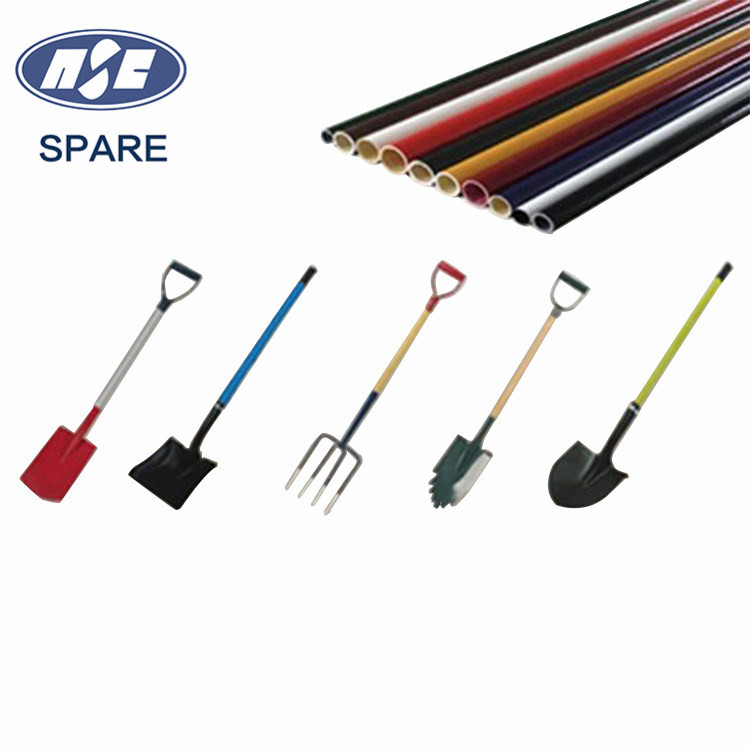- FRP Cable Tray System
- FRP Connectors
- FRP Handrails And Fences
- FRP Moulding
- FRP Pultruded Grating
- Residence Building
- Tool Handle
- Cooling Tower Structure
- FRP custom products
- Bridge Structure components
- FRP photovoltaic support
- Structural Component Applications
- Decking and Planting
- Decking and Planking
- FRP Assemblies
- FRP Decking and Planking
- FRP Building reinforcements
- FRP Structure shapes
01
Agricultural Hardware FRP Tool Handle
Advantages of Fiberglass Tool Handles High strength and light weight The significantly improved strength-to-weight ratio of polymer composites compared to traditional materials such as wood and steel has been a major factor in the success of this material. Compared to structural steel, pultruded fiberglass products offer significantly higher mechanical strength and a 75-80% weight reduction.
Reducing the weight distribution of handheld tools without reducing the mechanical strength of the tool helps create safer, more durable tools for everyday use. This reduces the labor involved in transporting and using tools without compromising their physical capabilities, such as their resistance to physical impact. Polymer composite tool handles are suitable for heavy-duty steel hammer heads with a low risk of mechanical degradation due to sustained physical impact. Tools for particularly demanding applications can be reinforced at predetermined stress points.
Corrosion resistance Wooden tool handles are susceptible to decay, especially when used frequently in wet or humid conditions or stored in outdoor tool sheds. Pultruded polymer composites can be reinforced by a “wetting” process that completely impregnates the glass fiber components with proprietary resins and creates a water-impermeable mechanical structure. This weathering performance represents a significant improvement over wood and steel, which are prone to oxidation and rusting through continued use.
The excellent corrosion resistance of polymer composites increases tool life by eliminating the risk of failure due to rot and reducing the effects of rusting steel components. This property also ensures that the tool remains tactile for longer to maintain the comfort of handling the tool.
Aesthetic options Polymer composite tool handles offer excellent mechanical properties and design advantages to meet a wide range of commercial needs. Polymer composites produced with tinted resins are not only able to take on a wide range of colors, but they also won’t flake or chip over time, making the aesthetic performance more durable and long-lasting. In contrast, the aesthetic treatment of paints and varnishes used to stain the surface of wood and metal tool handles degrades over time. The aesthetic properties of fiberglass tool handles, however, are embedded in their high-strength structural matrix, giving them long-lasting aesthetic appeal.
High strength and light weight
The significantly improved strength-to-weight ratio of polymer composites compared to traditional materials such as wood and steel has been a major factor in the success of this material. Compared to structural steel, pultruded fiberglass products offer significantly higher mechanical strength and a 75-80% weight reduction.
Reducing the weight distribution of handheld tools without reducing the mechanical strength of the tool helps create safer, more durable tools for everyday use. This reduces the labor involved in transporting and using tools without compromising their physical capabilities, such as their resistance to physical impact. Polymer composite tool handles are suitable for heavy-duty steel hammer heads with a low risk of mechanical degradation due to sustained physical impact. Tools for particularly demanding applications can be reinforced at predetermined stress points.
Corrosion resistance
Wooden tool handles are susceptible to decay, especially when used frequently in wet or humid conditions or stored in outdoor tool sheds. Pultruded polymer composites can be reinforced by a “wetting” process that completely impregnates the glass fiber components with proprietary resins and creates a water-impermeable mechanical structure. This weathering performance represents a significant improvement over wood and steel, which are prone to oxidation and rusting through continued use.
The excellent corrosion resistance of polymer composites increases tool life by eliminating the risk of failure due to rot and reducing the effects of rusting steel components. This property also ensures that the tool remains tactile for longer to maintain the comfort of handling the tool.
Aesthetic options
Polymer composite tool handles offer excellent mechanical properties and design advantages to meet a wide range of commercial needs. Polymer composites produced with tinted resins are not only able to take on a wide range of colors, but they also won’t flake or chip over time, making the aesthetic performance more durable and long-lasting. In contrast, the aesthetic treatment of paints and varnishes used to stain the surface of wood and metal tool handles degrades over time. The aesthetic properties of fiberglass tool handles, however, are embedded in their high-strength structural matrix, giving them long-lasting aesthetic appeal.
Product Drawing 
























